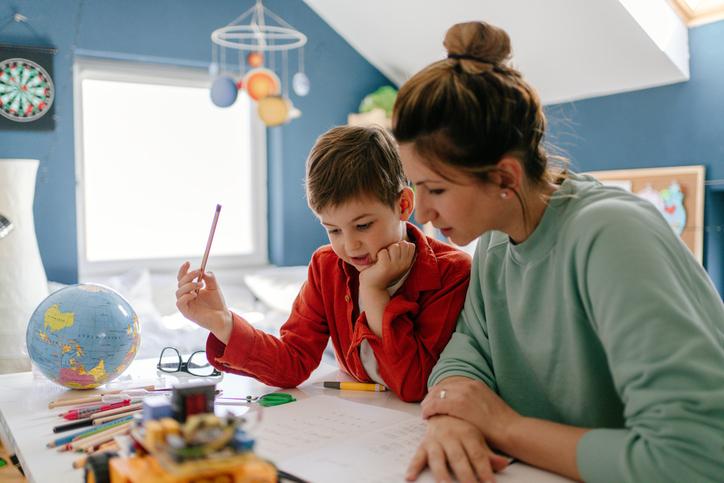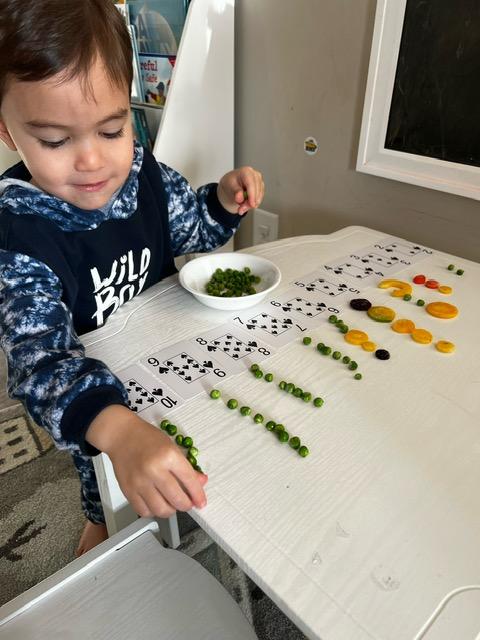This week is National School Choice Week! We are fortunate to live in a country where we have so many options to suit every student’s particular needs. One choice that is definitely on the rise but sometimes overlooked is homeschooling. The most basic definition of homeschooling is the process of parents educating their children at home. The number of families choosing to homeschool is increasing drastically, and understandably so. Homeschooling in the D.C. area can be particularly great thanks to the many resources, museums, history, and cultural events at our finger tips.
Check out all of the Homeschooling Resources Guide for DC, MD, and VA to get started!

What is Homeschooling?
As stated above, homeschooling is parents educating their children at home. Generally, the stay-at-home parent took on the bulk of this responsibility. (Growing up, to me a SAHM was synonymous with homeschooling mom!). Today, abundant resources are more available than ever. The overall homeschool community is growing. Many families having flex-work situations, so it is possible to successfully home educate even if one or both parents are working. It is not uncommon for both to play a very involved role in teaching.
During COVID-19, a lot of parents realized that having their children learn at home was not only doable, but preferable for many reasons. However, keep in mind that homeschooling is NOT: online school, remote learning, or public school from home. Homeschooling is a legal term aside from being a style of instruction or education choice, which means parents have full responsibility for the education of their children, and follow their state’s regulations in order to do so.
Why Homeschool?
Families may choose to homeschool for a variety of reasons, but some of the top ones are:
1. Providing a Safe Environment:
Concerns around issues such as gun violence, drug epidemics, negative peer pressure, and unprecedented bullying are valid. There is no safer place than a loving home, and a child will thrive in an environment that is unfettered by these threats. Even the most excellent school with the best teachers is not equipped to handle all safety concerns, nor can they control what your child may be exposed to by another student from a not-so-happy home.
2. Personalized Education:
All children require different teaching styles in order to learn and reach their potential. Some may be advanced in certain areas and need extra help in others. Some may have special needs that require undivided focus, and others need a chance to accelerate their learning and be allowed to concentrate on specific interests. All of this is not only achievable, but a way of life for the homeschooling family. It is one of the reasons why you will find a plethora of curriculum options and realize that a lot of families are using a combination of these plus their own developed systems to tailor their education to each particular child.
3. Religion:
Parents who homeschool are a diverse group: many will cite their ability to incorporate moral instruction according to the religion in which they are raising their children, others like that they can teach at home without reference to any religion at all. What is important is that the parents have the final say in what their children are learning, and cultivate an atmosphere of respect and practice for their beliefs.
4. Academic Performance:
Probably due to having a personalized, custom-built education, homeschooled students regularly score higher on standardized tests, and generally have no problem getting into the college of their choice and pursuing higher education. Additionally, they are a pretty well-rounded bunch: literary-minded and yet armed with plenty of practical skills. It is not uncommon to find a homeschooler who may seem like a philosophical bookworm but also has been skiing since they were three, loves engineering, and is comfortable with both baking and welding. These types do very well in academic settings past high school.
5. Flexibility:
When you homeschool, your children can and will learn anywhere. You are no longer tied to summer vacation, spring and winter breaks, and holidays for travel. Even better, all those trips can be incorporated right into your school plan, so the fun of learning never stops. Studying World War II? Let’s check tickets to Normandy! Homeschoolers have some of the best “field trips” both big and small. This flexibility is also appreciated by parents who are in the military, travel for work, or have health challenges.
6. Creativity and Independence:
Homeschooled kids have the advantage of retaining autonomy. While their lessons are tailored to them, they also are able to experience a lot more freedom in how, when, and where they occur (within reason!). A parent is also able to observe “burn out” and take a day or more to recuperate outside in nature or reset with a silly game. With a less regimented approach, children are able to build their confidence as well as their skill sets because their input is taken into account and their needs are prioritized. They may also maintain a healthier mindset about school, because they have a say in it.
7. Family Bonding Time:
Last but not least, homeschooling families enjoy the immense benefit of family bonding. This is a journey of learning for everyone involved. No time is wasted, and the parents and child(ren) are able to build place of love, trust and intellectual and creative pursuits. It is really hard to put a value on what this will mean for the student when it’s time for him or her to embark on their own, but I would say it’s priceless.

Is Socialization an Issue?
Not unless you make it one! All joking aside, truly the answer is no, socialization is not an issue. Just as introverts and extroverts can be found in any type of school or social setting, the same may be said of homeschoolers. In fact, it can provide very rich socialization opportunities since homeschooling parents are not relying on another school to provide the bulk of socialization, inevitably limited to just peers. The majority of those who choose to homeschool often put more effort into well-rounded socialization through a variety of extracurricular activities, co-ops, playgroups, church, and sports.
Of course, you will find the shy, quiet type just as you would in any classroom, and I hope the parent of any such child knows that’s perfectly fine! However, a common observation I hear when someone meets a homeschooler is how comfortable and outgoing that student is in any setting, and with any person regardless of whether they are the same age or not. This is, after all reflective of everyday life past the school age years.
Is it cheaper to homeschool?
Maybe, but not necessarily. If you are choosing between public school and homeschooling, the odds are it is not. As the parent-teacher, it is now up to you to not only feed, clothe and shelter your child, but select and procure and/or develop lesson plan(s) as well as any and all materials. Additionally, the extra-curriculars available through most schools such as sports, music, clubs, etc. may now come at an additional cost. As your children get older, you may also decide to invest in renting space at a science lab or workshop, register in a homeschool co-op, or hire a tutor for certain subjects.
If you are choosing between private school and homeschooling, the cost may be more comparable – it just depends. All the above still applies. Some homeschooling families spend more, others are able to do it for significantly less. In all scenarios and teaching styles, the public library system is one of our best friends!
What are the cons?
Planning lessons, activities, and the managing administrative requirements can be stressful. There is no one else to blame if things are not going well. “Me time” will likely get moved to the backburner quite a bit. Challenging lifestyle adjustments are sometimes necessary to accommodate the home school schedule or fact that the household is often (though not always) single-income.
You and your children may have to put a little more effort into finding and making friends (at least initially), and many school districts do not allow homeschoolers to participate in public school sports (although there are plenty of other leagues that do).
Homeschooling is a family affair and requires commitment. This option is probably not for you if you already know that your child will end up in front of a screen more often than not.
Is it hard?
If up until now you’ve decided I’m waxing poetic on the benefits of homeschooling, let me shatter that illusion for you now: homeschooling is really darn hard. My viewpoint is that no one ever said being a good parent in general was supposed to be easy, but none of us would have it any other way.
If you run into me, chances are I could use a haircut, am yearning for more time at the gym, or will be sporting embarrassingly chipped nails. I’ve deliberately stalled certain career ambitions, and could always use more sleep. I’m more than okay with all of that right now; incredibly happy and proud to be living the homeschool life. That doesn’t mean prioritizing this way isn’t challenging. My son has a mantra “I can do hard things!” and I believe we can all benefit from that mindset when things feel hard.
How do You Maintain a Work-Life Balance?
Currently, I have one child and he is not yet kindergarten age. Even though I don’t believe it’s necessary at this point, I do utilize a couple of preschool programs and regularly research and use supplementary materials for him, because he enjoys it. We do well with a little structure to our weeks. This takes time, effort, and planning my days more or less by the minute. It involves evenings of preparation for the materials themselves (think writing/drawing, printing, cutting, and gluing at this stage). I also work part-time since at the moment my kiddo still blessedly naps, and I weirdly enjoy being up to my neck with things to do. I update my calendar and task lists, have a notebook, and try to journal either by writing or taking photos.
My spouse is very hands-on when it comes to incorporating the learning subject of the week into projects and play when he isn’t at work. Household needs such as cooking, cleaning, laundry and shopping are a joint effort by us both. I handle the bulk of registering for, and transporting our little guy to and from various activities. We have developed a natural rhythm that works for us, but I expect will change as our child grows and we adapt.

You’ve got this!
Initially, I was intimidated by following in my supermom’s footsteps. During this stage of self-doubt, we even visited a few preschools. We ultimately decided that at least for the moment, homeschooling is best for us.
If someone isn’t a little worried about whether or not they are capable, I suspect they don’t care enough, or do not have a full picture of what homeschooling entails. Some families homeschool for the full 12 years, others for a short season. If you’re ready to begin, my advice is to give your perfectionist self some grace. Go look in the mirror with the reminder that YOU are your child’s best teacher.
Homeschooling in the D.C. area is seriously rewarding for the whole family. I hope this helps anyone who is exploring it as an option for their child(ren)’s education, or is just curious about their homeschooling neighbors! 🙂













